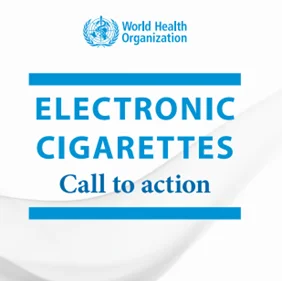- 23.02.2024
- News
World Health Organization Issues Urgent Call to Regulate E-Cigarettes Amid Rising Youth Addiction
In a decisive move, the World Health Organization (WHO) has issued an urgent call to action, urging governments worldwide to implement stringent measures to regulate e-cigarettes and curb their growing appeal among young people.

The WHO's call to action presents a technical note which provides a comprehensive plan to tackle what is now seen as an e-cigarette epidemic, given the rising addiction rates among adolescents. "There is an alarming increase in the use of e-cigarettes among children and young people," said Dr. Ruediger Krech, WHO Director for Health Promotion.
The WHO's recommendations include banning all flavouring agents in e-cigarettes, such as menthol, and restricting promotional features that make these products attractive to young users. The organization also proposes limiting nicotine concentration and quantity, setting maximum volumes for e-cigarette cartridges, and curbing the battery power of these devices to reduce nicotine and toxicant delivery. A novel aspect of this guidance is the prohibition of features that allow data transmission between the device and third parties, such as smartphone apps, which could be misused for personal data collection or to manipulate product use. The WHO is the first agency to highlight the problems whether tobacco companies are allowed to monitor and remotely control e-cigarettes.
Highlighting the gravity of the situation, WHO Director-General Dr. Tedros Adhanom Ghebreyesus noted, "Kids are being recruited and trapped at an early age to use e-cigarettes and may get hooked to nicotine."
This statement echoes the report's findings that more 13–15-year-olds are using e-cigarettes than adults in all WHO regions, a trend fuelled by aggressive marketing strategies employed by tobacco companies. In Switzerland, a tsunami of nicotine has been flooding the schools. The technical note also discusses how tobacco companies target children through social media and influencers, with thousands of flavours and appealing designs – which is also why they call on prohibiting attractive and/or promotional features related to the presentation and packaging of e-cigarettes.
E-cigarettes, which contain nicotine, are not only highly addictive but also pose significant health risks. Despite the lack of comprehensive data on their long-term health effects, it's established that they generate toxic substances linked to cancer, heart, and lung disorders. The WHO also raised concerns about the impact of e-cigarettes on brain development in young people and the risks to bystanders from emissions.
The WHO's call to action makes a vital distinction between e-cigarettes as consumer products and regulated products to be used under medical supervision. The organization emphasizes that e-cigarettes have not been proven effective for smoking cessation at the population level and should not be sold as consumer products for this purpose. The common argument that e-cigarettes are 95% less dangerous than traditional cigarettes remains a myth based of off inadequate scientific research. Instead, any smoking cessation strategy involving e-cigarettes should regulate them as medicines and ensure appropriate clinical conditions.
This comprehensive approach by the WHO is a crucial step in modernizing global perspectives on e-cigarettes. It serves as a call for governments and health advocates to prioritise public health and counter the influence of the tobacco and e-cigarette industry, which continues to promote these products to a new generation, risking an increase in health inequities and associated impairments. We hope that the WHO's strong stance resonates globally, and nationally with federal agencies in Switzerland, bringing about necessary policy changes and sparking a significant shift in the battle against nicotine addiction among youth.
Top of Form
WHO Sources:
WHO Electronic Cigarettes: call to action
WHO Technical note on the call to action on electronic cigarettes
Additional Sources: